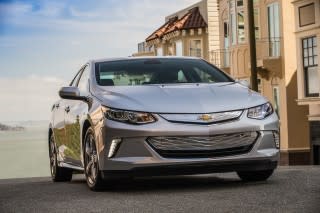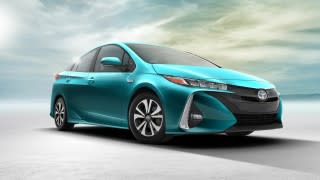CA plug-in carpool-lane access bill up for vote; here's why some oppose it
Several months ago, the allocated supply of "green stickers" that give buyers of new plug-in hybrid cars access to California carpool lanes expired.
So you think that a pending bill in the California state legislature to expand that supply would get the support of plug-in electric car advocates.
But Plug In America, the longstanding national advocacy group, opposes AB 1964—and is urging its members to take action against approval of the bill.
DON'T MISS: No More California Carpool-Lane Stickers For Plug-In Hybrids (Dec 2015)
The bill (AB 1964) is to be voted on today, and the current legislative session ends on August 31.
PIA has issued a legislative action alert for its California members that lays out what it views as the good and the bad of the proposed bill.
On the good side, PIA says, AB 1964 removes the current limit of 85,000 on the number of green stickers issued to plug-in hybrids.

The eligible vehicles include the Chevy Volt, the upcoming Toyota Prius Prime, and a slew of luxury plug-in hybrid SUVs.
Those stickers give plug-in hybrids access to the High-Occupancy Vehicle, or HOV, lanes on the state's notoriously congested freeways.
The green stickers given to buyers of plug-in hybrids purchased before January 2018—essentially the 85,000 already on the road today—would be good until January 1, 2019.
That's the date on which all current HOV-lane stickers, both green and white, expire.
But green stickers issued during 2018 from the newly expanded supply would be good through 2020.
Starting January 1, 2019, the bill also imposes an income limit on applicants for the increased supply stickers: $125,000 for a single filer, $170,000 for a head of household, and $250,000 for joint filers.

PIA objects to the bill's wording for two reasons.
First, the bill does not extend the current (unlimited) supply of white stickers for owners of battery-electric and hydrogen fuel-cell vehicles.
Those stickers are continuing to be issued today, but all current white stickers will expire as of January 1, 2019, while the new supply of plug-in hybrid green stickers won't.
CHECK OUT: Carpool-Lane Access: Very Important For Electric-Car Adoption, It Turns Out
Second, PIA objects to the income caps contained in the new bill, which it says will create "market uncertainty" at a time when sales of zero-emission vehicles remain very low.
It urges that these caps be removed, and that "additional incentives be put in place for the low-income and used vehicle market" instead.
Green Car Reports will update this article with further information on the fate of AB 1964 when it becomes available.
_______________________________________

 Yahoo Finance
Yahoo Finance 